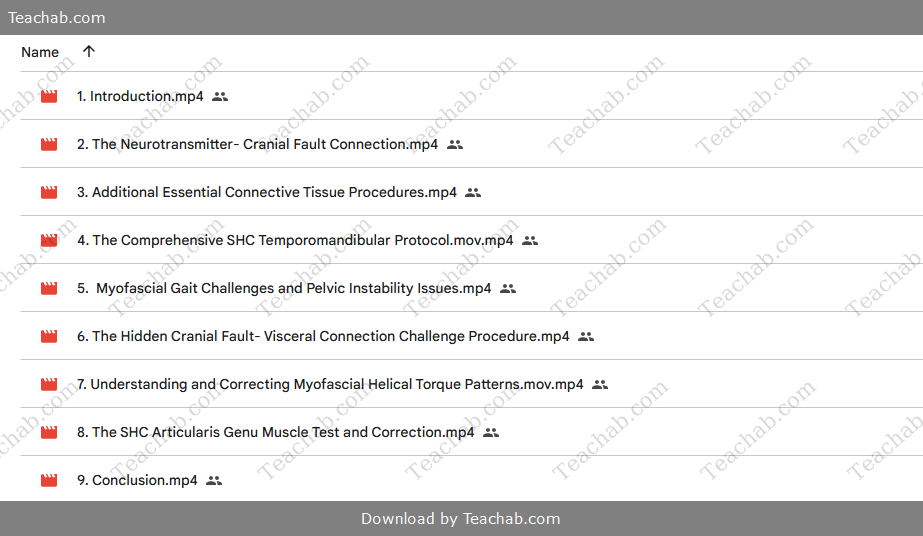Systems Health Care Next Level – Series 6 By Stephen Gangemi
$525.00 Original price was: $525.00.$93.00Current price is: $93.00.
Systems health care next level – series 6 by Stephen Gangemi – Immediate Download!
Let See The Content Inside This Course:

Description:
Health care systems around the world are changing at a rate never seen before. The rise of holistic health viewpoints offers a new way of looking at the complex relationships that exist inside the human body. “Systems Health Care Next Level – Series 6” by Dr. Stephen Gangemi is the lighthouse of this development, pointing medical professionals in the direction of a greater understanding of natural health care methods.
By incorporating cutting-edge ideas in holistic health, this series highlights the value of treating symptoms only and seeing health as a network of interrelated systems. Gangemi offers useful tactics that not only advance our knowledge of health but also increase patient treatment, drawing on his vast experience since 1998 and expertise in functional neurology, applied kinesiology, and clinical nutrition.

Comprehending Holistic Health
More than just a catchphrase, holistic health represents a change in how we think about wellbeing. Holistic health is based on the fundamental idea that the human body functions as a complex network of interconnected systems that influence one another. The interconnected networks are affected when one system fails, which eventually has an impact on general health. This viewpoint strikes a deep chord in Gangemi’s writing, especially in the series in question.
Dr. Gangemi’s investigation of neurotransmitter connections and their effects on health serves as an example of this mindset. For example, neurotransmitters like dopamine and serotonin are essential for controlling emotions and mood. One example of how several bodily systems are interconnected is the spiral of mental health problems that can result from a disruption in these neurotransmitters. Gangemi gives practitioners the ability to approach healthcare more holistically by emphasizing these linkages, going beyond discrete therapies and promoting a more thorough comprehension of patients’ needs.
The series also focuses on myofascial adjustments, highlighting the important role that the fascial system—which surrounds muscles and organs—plays in the body’s overall functioning. The interdependence of ecological systems in nature is reflected in the idea that dysfunction in one area might result in compensations and malfunctions in other areas. Ignoring the connections between different body systems can lead to general health problems, much like eliminating a keystone species might cause an ecological collapse.
Practical Strategies for Optimization
Gangemi’s series encapsulates practical strategies that practitioners can adopt to foster better health outcomes in their patients. These strategies are pivotal not only for addressing existing health concerns but also for optimizing overall well-being. Below are some key methodologies recommended in “Systems Health Care Next Level – Series 6”:
- Comprehensive Evaluation:
- Undertake thorough assessments that evaluate structural and biochemical states of the body.
- Employ functional neurology assessments to map out patient health profiles accurately.
- Myofascial Corrections:
- Implement myofascial release techniques to alleviate muscular tensions and improve movement patterns.
- Educate patients on the significance of fascial health in supporting overall body function.
- Neurotransmitter Testing:
- Utilize testing protocols to check the balance of neurotransmitters.
- Provide tailored nutrition and supplementation plans to optimize neurotransmitter levels.
- Holistic Integration:
- Merge insights from various disciplines such as applied kinesiology and clinical nutrition for a comprehensive treatment plan.
- Create synergistic treatment approaches that resonate with patients’ unique needs.
Implementing these strategies fosters an environment where health practitioners can genuinely partner with their patients, encouraging them to take an active role in their health journey. Rather than being passive recipients of care, patients are empowered to understand their health from a holistic standpoint, promoting sustainable health improvements over the long term.
Taking Care of the Fundamental Cause
The propensity of traditional healthcare to put symptom management ahead of determining the underlying cause is one of the obvious problems. This paradigm is challenged by Gangemi’s method, which is outlined in the series, which calls for a careful examination of the fundamental causes of health problems. The growing trend toward functional medicine, which stresses treating the body as an interrelated whole rather than a collection of pieces, is consistent with this philosophy.
Take a patient who has persistent migraines, for example. The traditional method can concentrate on writing prescriptions for drugs that reduce pain. Gangemi’s approach, however, pushes clinicians to look more closely at the patient’s medical history, looking at things like stress, nutrition, spinal alignment, and even neurotransmitter balances that might be causing the headaches. By addressing the underlying causes, this integrated method not only treats the current symptoms but also reduces their frequency in the future.
Case Study: Migraine Management
- Patient Profile: 35-year-old female, experiencing chronic migraines for 5 years.
- Initial Approach: Prescribed pain relief medication without thorough evaluation.
- Intervention Based on Gangemi’s Framework:
- Comprehensive evaluation of neurotransmitter levels.
- Myofascial release to address muscular tensions and spinal alignment.
- Dietary adjustments targeting inflammation and dehydration.
By employing a holistic approach, the patient was able to significantly reduce the frequency and intensity of her migraines, demonstrating the effectiveness of addressing root causes rather than merely treating symptoms. Such outcomes reiterate the importance of intuition, critical thinking, and comprehensive knowledge in health care practices.
Practitioners’ Function in Holistic Health
The role of practitioners must change in tandem with the move toward a systems-based approach to healthcare. Both a manual and a reminder that effective healthcare requires teamwork are provided by Dr. Gangemi’s series. In addition to providing treatment, health professionals are expected to empower and educate their patients. There are numerous examples of successful patient involvement strategies that demonstrate a significant improvement in both patient engagement and health outcomes.
Patients who get health education develop a sense of responsibility and ownership. Patients are more engaged in their health journeys when they comprehend the complex relationships between different body systems. Similar to how information has revolutionized the market for sustainable products, this empowerment may be equated to transforming regular consumers into knowledgeable champions.
Another essential component is the incorporation of feedback mechanisms. By applying the techniques described by Gangemi, practitioners can create a culture of ongoing feedback, which enables treatment plans to be modified in response to patient responses. In addition to improving care, this iterative approach strengthens the bonds between patients and practitioners, which are essential for long-lasting health gains.
In conclusion
Stephen Gangemi’s “Systems Health Care Next Level – Series 6” emphasizes the importance of taking a comprehensive approach to comprehending health and wellness. Health professionals can gain a deeper understanding of how body systems are interconnected by adopting this all-encompassing paradigm, which will result in more efficient and individualized patient treatment. For individuals who are dedicated to improving their practice and health outcomes, the focus on treating underlying problems, empowering patients, and putting workable ideas into practice acts as a road map.
The work of Dr. Gangemi portends a bright future for healthcare that supports a more comprehensive view of health and places an emphasis on holistic well-being rather than symptom control. We all set out on the same path to attain optimal health, which is genuinely an interrelated adventure.
Frequently Requested Enquiries:
Innovation in Business Models: We employ a group buying strategy that allows customers to divide costs and receive a lower rate for popular courses. Despite content providers’ concerns about distribution tactics, this approach benefits low-income individuals.
Legal Aspects: The legality of our conduct raises a number of complex issues. Although we do not have the course developer’s official permission to redistribute their content, there are no clear resale restrictions stated at the time of purchase. We have the opportunity to provide affordable educational resources because of this uncertainty.
Quality Control: We ensure that all of the course materials we purchase are identical to those supplied by the writers. However, it is important to understand that we are not approved vendors. Consequently, our products don’t include:
– In-person consultations or phone conversations with the course developer for advice.
– Access to sites or organizations that are exclusive to authors.
– Engaging in private forums.
– Simple email support from the author or their team.
By offering these courses independently, without the premium services of the official channels, we hope to reduce the barrier to education. We appreciate your understanding of our unique approach.
Be the first to review “Systems Health Care Next Level – Series 6 By Stephen Gangemi” Cancel reply
You must be logged in to post a review.

 ONLINE COURSE MULTI-PACK (Complete Rehab Programming 1+2+3) By Tim Keeley
ONLINE COURSE MULTI-PACK (Complete Rehab Programming 1+2+3) By Tim Keeley 














Reviews
There are no reviews yet.